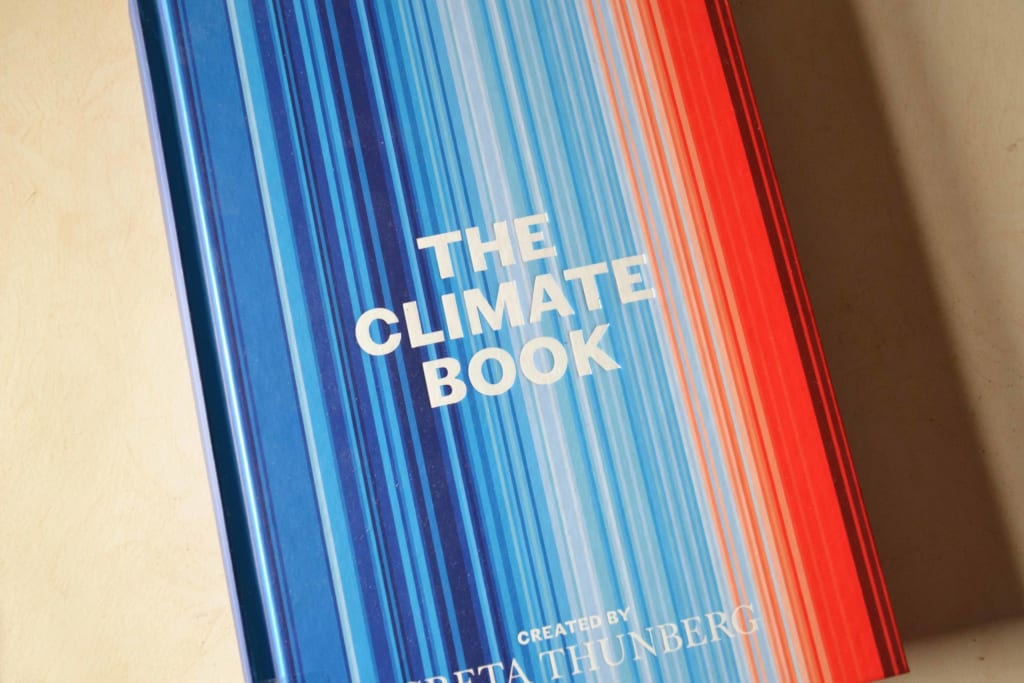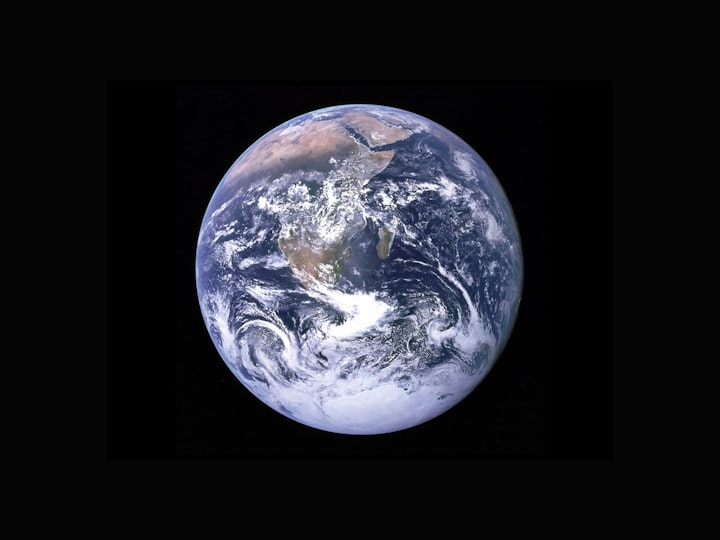Greta Thunberg’s Plan to Displace Capitalism & Embrace Utopia
My thoughts on Greta Thunberg’s new book

Greta Thunberg famously declared war on capitalism when she published her latest book back in October 2022. I wondered what her anti-capitalist vision of a future world would look like, so I delved into ‘The Climate Book’ to get a sense of Greta’s ideas for a Utopian future.
Each section of the book is introduced by Greta, then populated with contributions by different authors, including well-known names like George Monbiot, who writes for The Guardian, and young climate activists who you’ve probably never heard of.
Most of the book focuses on the problems we’ll face from a warming planet — not the solutions, as is Greta’s style and something I’ve expressed frustration about in the past. I want to see more on solutions. This book goes some way to discussing the solutions as well.
It’s impossible to cover all the contents, but I’m going to explore some of the most interesting ideas.
Fairytales of Economic Growth
Greta has famously accused world leaders of pedalling ‘fairy tales of economic growth’, which are completely unrealistic and unsustainable.
Chapter 4.26 of the book is entitled ‘Degrowth’ by Jason Hickel. It explores how an alternative world might look, if we stopped aiming for growth across all sectors, and actually managed a period of degrowth of the most polluting industries, while selectively growing the industries that benefit the planet.
Hickel argues that the most destructive sectors of the economy should be scaled down, for example, air travel, fast fashion, manufacturing of the most polluting vehicles, beef production, and technology with planned obsolescence.
This would obviously impact the livelihoods of people working in these sectors. So Hickel argues that where this means fewer jobs, “we should shorten the working week and share necessary work more evenly.”
He also argues that we should train people for important jobs in sectors that benefit the planet — such as renewable energy, home insulation, local food, and rewilding.
Public services should be expanded so that everyone has all they need, he says, regardless of income. Not just healthcare and education, but also, housing, transport, energy, internet access, and water.
Barriers to implementing the Utopia
This all sounds great, but I can see some problems with it. First of all, people’s resistance to change. There is huge demand from people in our societies for the worst polluting industries. If there wasn’t demand, these industries wouldn’t exist.
People want to spend their money on SUVs, air travel, fast fashion, beef production, and the latest tech — which has planned obsolescence built into it. These are not the purchases of just the wealthy, but of ordinary people in the developed world, including environmentalists who are notorious for flying to climate rallies.
Any government who tried to ban these things, or scale them down dramatically, would be voted out. Unless there’s a massive shift in society’s attitudes.
Hickel says that most people would regard his ideas as sensible. They might think it seems sensible on paper, but once you start telling people that they cannot have what they want, and they cannot do what they want, I suspect they’ll be angry, not thinking, ‘that’s sensible’.
Even hardcore environmentalists will argue about their air miles being justified. I’ve had climate campaigners jump into my comments to tell me to get on a plane and join them in their protests, because my efforts to live a low carbon life are futile. But if enough people made changes, it wouldn’t be futile.
We all need to play our part. Everyone needs to get on board. The fact that environmentalists themselves won’t do it, and would rather argue about it and insult me for trying, speaks volumes about how willing people really are to change.
Individuals must change, says Greta
Greta’s book is clear that while structural change of our societies is needed, individuals must change too. Without individuals being willing to change, we’re on a path to failure, because politicians who try to force change on an unwilling and antagonistic society, will be voted out.
Members of society need to lead the way by living the change that they want to see, getting the message out to other people about the crisis we’re in, and pressuring governments to make structural change for a better future. Greta lists ways we must change, which I’ll detail further down.
Media bias
Greta criticises the media for failing to report on the climate situation fairly. They try to be balanced, giving equal exposure to the views from environmentalists as well as the industries that pollute. But in-so-doing, they fail to effectively report on the reality of the crisis that’s facing the world.
Our media will applaud a new industry opening up because of the jobs it creates — but they don’t report on the environmental impact of that industry. In that respect, most reporting is not balanced but is, in fact, biased. She calls for more balanced reporting that does include the environmental impacts of industries and initiatives.
There has, of course, been more reporting of extreme weather in recent years, but it seems, for the most part, these messages are not waking people up to the scale of the problem and the changes that need to be made to prevent catastrophe.
Let’s talk about carbon footprints
One of the arguments for not reducing our individual carbon footprint put forward by some activists, is that the concept of the individual carbon footprint was actually created by the fossil fuel industry. Greta’s book does give a passing mention of this, saying the first carbon calculator was developed by the petroleum giant, BP.
They presumably developed the concept in response to environmentalists arguing that they should not be trading in fossil fuels, full stop — and that alternative technologies should be available.
That’s absolutely correct — alternative technologies should be available — but until those alternative technologies are fully developed and available to everyone, in my opinion, our individual impact on the environment is still valid. And we should reduce our consumption of fossil fuels, where possible. Greta seems to be in agreement with this.
What needs to be done
The book concludes with a chapter written by Greta on, ‘What Needs to Be Done’. It’s the shortest chapter and the part I’m most interested in.
I’m interested in solutions, because I already understand the problems. Much of the section reads like the Green Party manifesto on green issues, which is perhaps what you’d expect.
Make public transport free of charge
As a young person, I used to feel this was an obvious solution! A way to get people out of their cars and onto public transport. The book tells the story of a free public transport trial in Germany, which didn’t have the benefits they’d hoped for. The people who used public transport used it more, but the people who didn’t, continued to use their cars.
However, a more recent trial offering tickets for 9 Euros on German public transport in 2022 was a big success. It reduced car use and cut 1.8m tonnes of C02. Perhaps it was better implemented.
My feeling is that you need to do this for long enough to discourage people from buying cars in the first place. Once someone has invested in a car, insurance, tax, etc, the extra cost of petrol for the convenience of a car is relatively small.
However, if people didn’t buy cars because the lure of free public transport was so appealing, the policy of free (or much cheaper) public transport could have more impact over the longer term. Then they could rent or join a car pool for when a car is really needed.
End fossil fuel subsidies
Absolutely! Why are we even still subsidising them?
Leapfrog to renewable energy
I’ve been researching offshore windfarms recently, and in the UK we’ll be surrounded by offshore windfarms in the coming years. It’s a major part of our clean energy strategy for the future. We’re making good progress, but more is needed. It’s a growth area in the USA too.
In the UK, new nuclear power stations are going up, which are controversial, but some say essential. Wave power has a lot of potential too, but is currently not a major part of the UK plan.
However, around the world there is still too much reliance on coal. Environmentalists were appalled at the end of last year, to see a new coal mine approved by the UK government. The government made the decision to help secure the country’s future energy supply, independent of Russia.
Avoid false solutions like biofuel
One of the UK’s energy ‘solutions’ is biofuel, but burning wood actually emits more greenhouse gases than coal, and not all of the wood is coming from renewable forests. Much of it comes from primary forests, and is shipped into the UK from overseas. It’s a farce.
Cutting down trees, sustainably managed or not, also has a negative impact on the wildlife who live in the woodlands and forests, resulting in habitat loss and reduction in biodiversity. It’s not the best solution by a long way. It’s arguably one that should be abandoned altogether.
Eat plant based
More people are adopting plant based diet, but most people won’t. I’m vegan. Are you willing to eat more greens and cut back on beef? It’s better for your health if you choose healthy foods, too.
Buy less and use less
This is key to a better future. We, as individuals and as a society, consume too much. The problem is, people are addicted to stuff and their lifestyles. They don’t want to consume less. They care more about protecting their lifestyles than the future of the planet.
This takes me back to the campaigners arguing that their flights are justified and their individual carbon footprints are irrelevant because the fossil fuel industry created the concept. When the climate campaigners themselves won’t accept responsibility for their own consumption, what are the chances of those who aren’t aware of the problem embracing change? My guess is zero.
Stop flying
That’s Greta suggestion. Not mine. Don’t shoot the messenger. I haven’t flown in 20 years. I think stop flying is a great idea. I’d like to see flights limited to those who have a damn good reason. Holidays are not a damn good reason. I know it opens the mind, but it destroys the planet. Argue if you must.
Help developing countries
Help developing countries to transition to sustainable lifestyles. This would be the right and moral thing to do. Those first world countries who’ve caused the problem of climate change should help those most affected by it, to manage the negative effects and transition to a sustainable future themselves.
Expand public transport
Greta says electric cars for everyone is not the answer because that’s unsustainable too. The lowest emitting form of transport should be the cheapest. I suspect she’s right on the first point and I agree with the second.
My conclusion on the book!
The book is a huge and might seem overwhelming at first, but it’s surprisingly easy to read and accessible. You can dip in and read the chapters you’re interested in, but not all of it, if it seems overwhelming. Borrow it from the library because that’s the most sustainable thing to do.
We all have a choice
To my mind, the argument that ‘we have no alternative’, doesn’t excuse overconsumption and waste. Most people can choose to buy less, use less, choose not to fly, choose fuel-efficient transport, choose to put another jumper on.
We can choose to consume less and it saves us money. It’s a win for our finances and a win for the environment. We do have a choice about how destructive our lifestyles are. We can choose to turn the thermostat down, or turn the heating ‘off’.
No, we can’t change the world on our own, but until new technologies are rolled out so that we can transition as a whole society to a more sustainable way of life, there’s merit in taking personal responsibility.
Of course we must break the monopoly that fossil fuel companies have on our power systems and lifestyle, but that doesn’t absolve us of the responsibility to live carefully until that time comes.
The book repeats the often quoted citation that 100 companies produce 70% of global emissions. But if you look at the list, they’re fossil fuel companies, and the people actually burning those fuels are us, every time we buy or consume something, every time we pay a company to burn fossil fuels, so we can have more stuff.
We can choose to buy less. Switch to greener alternatives where possible. I’m sitting in a sunny window, instead of turning the heating on. It works.
© Susie Kearley 2023. All Rights Reserved.






Comments
Susie Kearley is not accepting comments at the moment
Want to show your support? Send them a one-off tip.